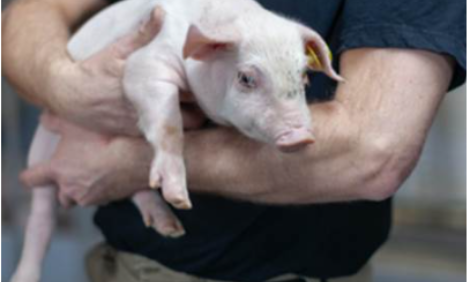



Perception vs. reality in the pork industry
By Wayne Caldwell, associate professor, University of Guelph and published by Alberta Pork - The results of a survey on rural residents’ opinions of their pork producing neighbours may be surprising to some.Separating the perception of the pork industry from its reality is a key to better relationships with the communities where pork producers live and work, says an associate professor from the University of Guelph in Ontario.
Wayne Caldwell was at the forefront of a research project in Ontario which studied the perceptions of neighbouring residents on several sizeable livestock operations. Describing the results as “a good news story,” Caldwell says one key finding was that neighbours were more likely to change their negative opinions of the industry after being exposed to hog production in their communities.
 Caldwell recommends that producers alert their neighbours before they apply manure in order to sustain and improve community relationships. |
However, he warns that this positive feedback is not an invitation for pork producers to rest on their laurels when it comes to communication with their neighbours. Rather, it highlights the need for producers to equip their communities with accurate information in a neighbourly, non-confrontational manner. And with urbanization and greater specialization of agricultural practices threatening to divide rural communities, there is more need than ever for this kind of ambassadorship.
“There is a general perception out there, for example, that ‘big is bad’ when it comes to size of a hog operation,” says Caldwell. “This is not necessarily so, but we have to deal with such perceptions because these issues can become very intense and controversial unless proactive action is taken. Fear can arise due to lack of knowledge.”
Potential conflict
The potential for conflict between producers and their neighbours should not be underestimated, says Caldwell. However, a little communication can go a long ways towards resolving conflict when it happens. Caldwell cites an example of an Ontario producer who raised concern among his neighbours after spreading manure on a hot long weekend day.
The situation was tempered somewhat when it was discovered that he was a recent immigrant who didn’t understand the significance of the holiday. The matter was resolved as a result of these efforts to communicate. “If you deal with matters in a friendly way with minimal conflict, you will probably have better neighbour relations.”
Exposure drives understanding
The pork industry has long been a focal point for conflict over a myriad of environmental ills. The need to address the roots of those concerns is crucial, says Caldwell, and that need was the driving force behind the University of Guelph survey. Over five years, 180 respondents in direct proximity to 50 confined feeding operations (CFOs) provided input on how these farms affected their day-to-day lives and how they felt these operations brought value to their communities. The survey also captured the perspectives of the CFO operators.
In most of the survey categories, negative comments about a given CFO decreased upon the unit becoming operational. Building location, for example, tended to become less of an issue, with negative feedback dropping from 17 percent to nine percent. Appearance concerns dropped by approximately the same percentage. Negative opinions over odour, pests and weeds, farming practices and water quality all saw moderate drops, while dust and dirt concerns increased marginally.
The survey also gauged how the presence of a CFO affected lifestyle. Close to 60 percent said they had not made any changes in their day-to-day practices as a result of the presence of a CFO. However, close to 40 percent said they kept their windows closed and about 25 percent said they had stopped hanging laundry out to dry.
Although this consensus may not be as negative as some in the pork industry may have expected, Caldwell urges producers to not be complacent. “If you have nearly 40 percent of your neighbours saying they’re keeping their windows closed, that should be treated as a real point of view,” he says.
An open door policy
Although some of the CFO operators surveyed expressed frustration over neighbour demands, the survey indicates that the CFO operators are adopting production practices in the interest of better community relations, with manure handling and application, at 30 percent of those surveyed, being by far the practice most respondents said they had changed for this reason.
Consensus among those surveyed suggests that CFO operators are striving towards an “open door” policy of communication with communities, facilitated with invitations to visit the farm, open houses and prior warning of farm practices. Some operators, however, said that informing neighbours of their practices or expansion tended to worsen situations. Others said their efforts to engage their communities in discussions about their operations met with disinterest.
Disputes were not the exclusive domain of producers versus non-producers, however. The move away from mixed farms in the greater agricultural community has splintered rural areas to some extent, resulting in inter-agriculture conflicts. Another emerging trend is conflict between generations of producers. “There are issues raised by farm residents who are jealous of us who are older and follow a more traditional way,” said one respondent.
Proactive action recommended Several lessons were learned from both the neighbour and operator sides of the CFO equation, says Caldwell. Key among them is the need for operators to tackle perception head-on before it becomes reality. This “proactive action” can take several forms, with perhaps the most effective option being a good neighbour policy, says Caldwell. One sign of this policy includes holding public consultations to inform neighbours of new developments or existing activities. Another is good planning around where building sites are located, which can go a long way towards preventing conflict. “Ultimately, a good neighbour policy will almost certainly lead to better relationships with neighbours.”
October 2006








